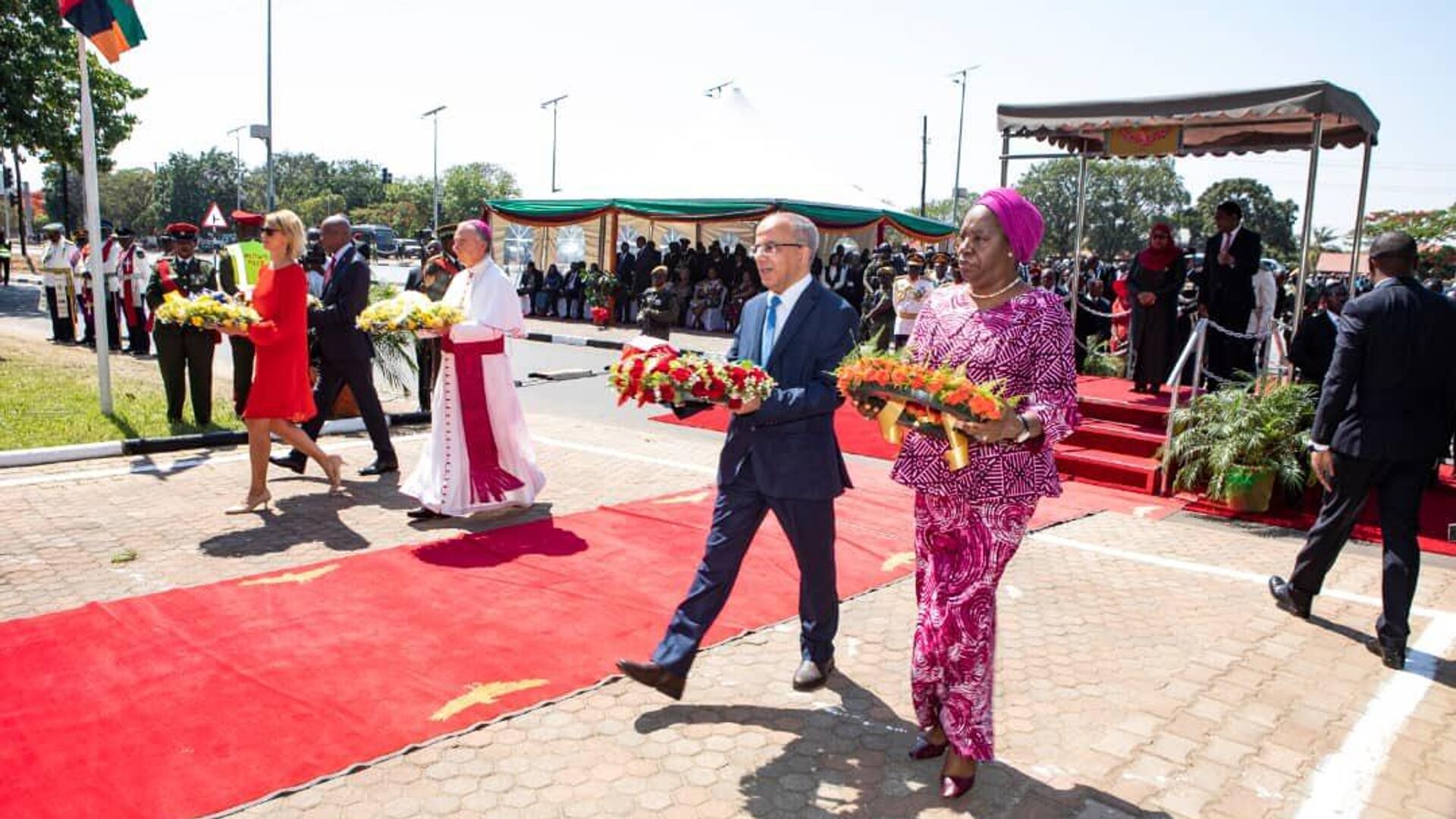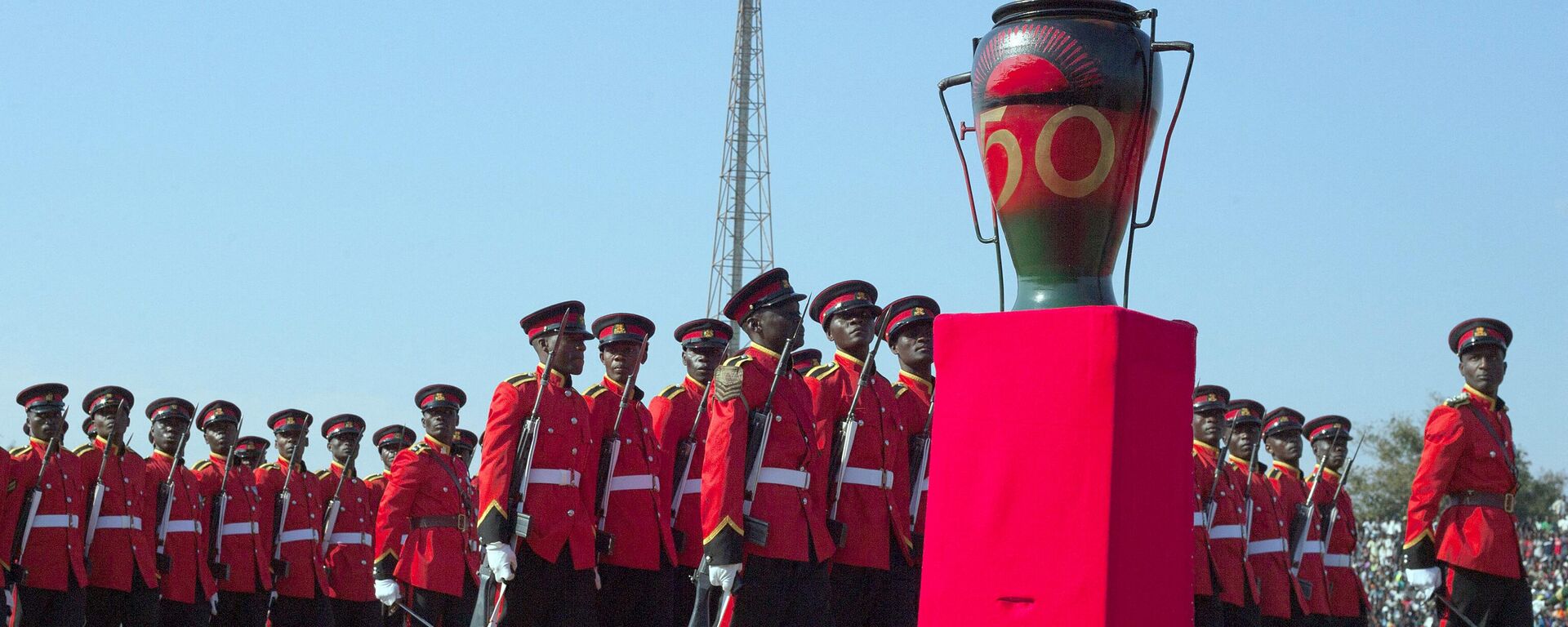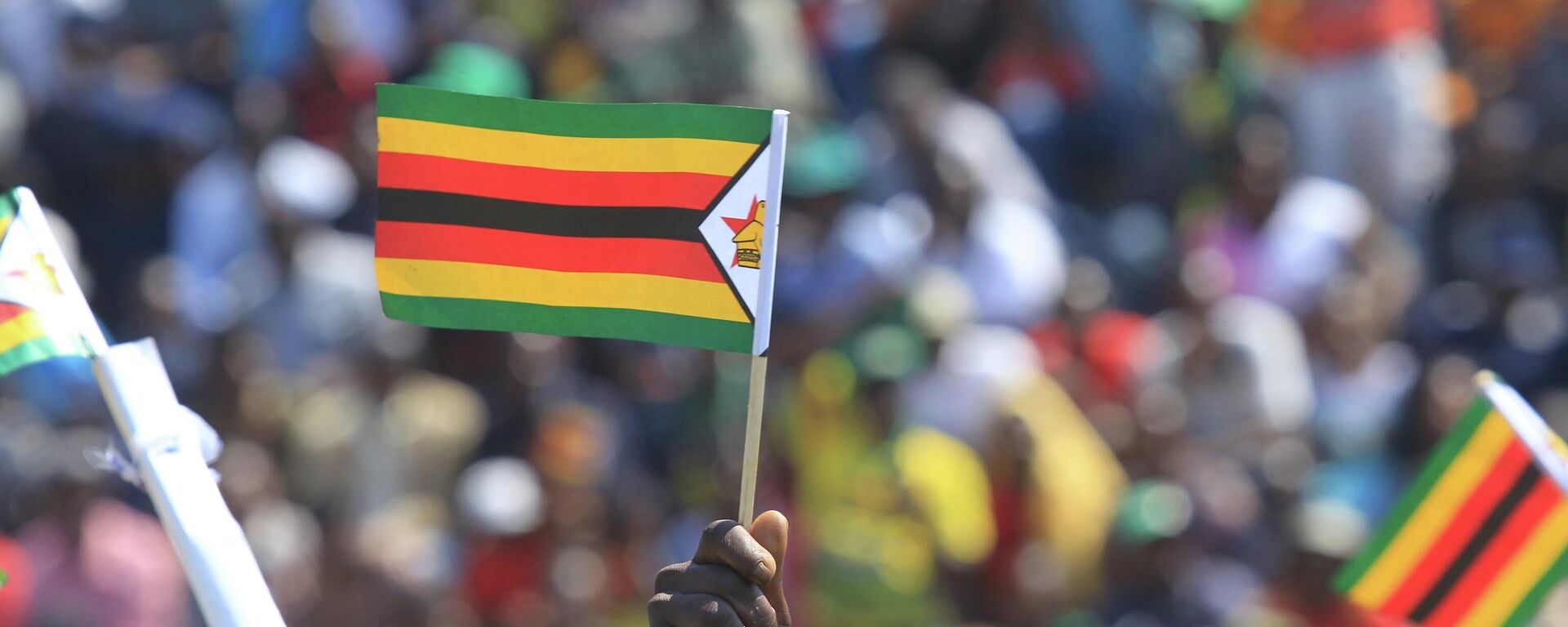https://en.sputniknews.africa/20231024/another-year-of-peace--unity-zambia-celebrates-59th-independence-anniversary-1063049597.html
'Another Year of Peace & Unity': Zambia Celebrates 59th Independence Anniversary
'Another Year of Peace & Unity': Zambia Celebrates 59th Independence Anniversary
Sputnik Africa
On October 24, Zambia celebrates Independence Day. This important day signifies the country's liberation from the British colonial rule in 1964 and is... 24.10.2023, Sputnik Africa
2023-10-24T16:44+0200
2023-10-24T16:44+0200
2023-10-24T16:44+0200
features
zambia
southern africa
colonialism
british colonialism
independence
celebration
national holiday
holidays
united kingdom (uk)
https://cdn1.img.sputniknews.africa/img/07e7/0a/18/1063051975_0:56:1080:664_1920x0_80_0_0_6877f5072a6380453ad7acf2b67f55be.jpg
As Zambia commemorates its independence struggle by holding celebrations throughout the entire country in honor of those who fought for freedom, Sputnik Africa takes a look at major events in its history that paved the way for the nation to put an end to colonial rule and become independent.Zambia's Path to Independence As Zambia has no access to the sea, European colonizers did not explore the region located at the junction of Central, Southern, and East Africa until the end of the 19th century. However, in 1888, Cecil Rhodes, head of the British South Africa Company and advocate for British commercial and political interests in Central Africa, acquired a concession for mineral rights from local chiefs for the area which then became Barotziland-North-Western Rhodesia. The suppression of tribal uprisings in the eastern area led to the formation of North-Eastern Rhodesia and complete British control over the region. North-Eastern Rhodesia and Barotziland-North-Western Rhodesia were separately administered until 1911 when they merged to become Northern Rhodesia (modern Zambia).Later, Northern and Southern Rhodesia (now known as Zimbabwe), a conquered territory which was also administered by the company, were declared a British sphere of influence. Southern Rhodesia was officially annexed and given self-government in 1923, while the British Colonial Office took over administration of Northern Rhodesia in 1924, making it a protectorate.After World War II, a long process of decolonization started on the continent, with nations gradually achieving autonomy or outright independence from their European colonial rulers. In 1953, the UK formed the Federation of Rhodesia and Nyasaland, comprising Northern Rhodesia, Southern Rhodesia, and Nyasaland (now Malawi). From 1953 to 1963, Northern Rhodesia was a protectorate under the jurisdiction of the British Crown.The establishment of this federation was met with strong opposition from the people of Northern Rhodesia, who took a firm stand against it. As a result, two nationalist parties emerged and general strikes occurred from 1960 to 1961. Two rounds of elections in October and December 1962 resulted in an African majority in the legislative Council, creating a coalition between the two parties.The council passed resolutions calling for the secession of Northern Rhodesia from the federation, demanding internal self-governance with a new constitution and a new National Assembly. Following strong protests and proposals of the council, the federation was eventually dismantled in December 1963.In January 1964, general elections were held, and President Kenneth Kaunda was inaugurated 10 months later, on October 24, 1964. On this day, Northern Rhodesia officially gained its independence from the United Kingdom and became the Republic of Zambia.The people of Northern Rhodesia strongly opposed this decision and took a strong stand against the creation of the federation. This led to the emergence of two nationalist parties, and general strikes began from 1960 to 1961. As a result of strong protests by the forces of Northern Rhodesia, the federation was finally dispersed in December 1963. In January 1964, the country held general elections, and President Kenneth Kaunda took office 10 months later, on October 24, 1964. The President renamed the country the Republic of Zambia.How Zambians Celebrate Independence DayEvery year on October 24, Zambians across the nation engage in a variety of festivities, cultural events, parades, and meetings to commemorate the occasion. Celebrations are especially lively in the capital city of Lusaka where the country's continued peace and sovereignty are honored through traditional music, dancing, concerts, and the grand Independence Day parade.This year, President Hakainde Hichilema participated in a long-standing tradition by laying wreaths at the Freedom Statue situated in front of the government offices in Lusaka to pay tribute to the fallen freedom fighters. The statue features a man breaking free from chains, symbolizing the struggles Zambians endured while overthrowing colonialism's shackles. It was erected in 1974 to commemorate Zambia's 10th anniversary of independence. Although the country achieved independence without resorting to civil war or armed revolution, the struggle for freedom was protracted and marred by sporadic violent suppression by the colonial government.The Zambian leader was accompanied by Samia Suluhu Hassan, his Tanzanian counterpart whose two-day state visit coincided with the 59th Independence Day celebrations in the country.In his address to the nation, the president congratulated Zambians on the 59th independence anniversary, stressing that October 24 marked the beginning of a new "era of freedom from colonial rule," self-determination, and national sovereignty.He noted that this day is an occasion for people across the nation "to take time to reflect" on their journey and the progress they have made towards realizing their national aspirations and goals. Hichilema reiterated that the country remembers and honors its "brave men and women for the sacrifices they made" to attain independence and create a better future for the generations to come.
https://en.sputniknews.africa/20230706/malawi-celebrates-59-years-of-independence-with-renewed-unity-and-patriotism-1060369588.html
https://en.sputniknews.africa/20230814/zimbabwe-marks-43rd-national-heroes-day-to-mourn-gallant-sons-1061312726.html
zambia
southern africa
united kingdom (uk)
Sputnik Africa
feedback@sputniknews.com
+74956456601
MIA „Rossiya Segodnya“
2023
News
en_EN
Sputnik Africa
feedback@sputniknews.com
+74956456601
MIA „Rossiya Segodnya“
Sputnik Africa
feedback@sputniknews.com
+74956456601
MIA „Rossiya Segodnya“
zambia, southern africa, colonialism, british colonialism, independence, celebration, national holiday, holidays, united kingdom (uk)
zambia, southern africa, colonialism, british colonialism, independence, celebration, national holiday, holidays, united kingdom (uk)
'Another Year of Peace & Unity': Zambia Celebrates 59th Independence Anniversary
Longread
On October 24, Zambia celebrates Independence Day. This important day signifies the country's liberation from the British colonial rule in 1964 and is recognized as the national holiday. It is a joyous occasion for all Zambian residents to join nationwide celebrations and pay tribute to their past while looking forward to a brighter future.
As Zambia commemorates its independence struggle by holding celebrations throughout the entire country in honor of those who fought for freedom, Sputnik Africa takes a look at major events in its history that paved the way for the nation to put an end to colonial rule and become independent.
Zambia's Path to Independence
As Zambia has no access to the sea, European colonizers did not explore the region located at the junction of Central, Southern, and East Africa until the end of the 19th century. However, in 1888, Cecil Rhodes, head of the British South Africa Company and advocate for British commercial and political interests in Central Africa, acquired a concession for mineral rights from local chiefs for the area which then became Barotziland-North-Western Rhodesia.
The suppression of tribal uprisings in the eastern area led to the formation of North-Eastern Rhodesia and complete British control over the region. North-Eastern Rhodesia and Barotziland-North-Western Rhodesia were separately administered until 1911 when they merged to become Northern Rhodesia (modern Zambia).
Later, Northern and Southern Rhodesia (now known as Zimbabwe), a
conquered territory which was also administered by the company, were declared a British sphere of influence. Southern Rhodesia was officially annexed and given self-government in 1923, while the British Colonial Office took over administration of Northern Rhodesia in 1924, making it a protectorate.
After World War II, a long process of decolonization started on the continent, with nations gradually achieving autonomy or outright independence from their European colonial rulers. In 1953, the UK formed the Federation of Rhodesia and Nyasaland, comprising Northern Rhodesia, Southern Rhodesia, and Nyasaland (now
Malawi). From 1953 to 1963, Northern Rhodesia was a protectorate under the jurisdiction of the British Crown.
The establishment of this federation was met with strong opposition from the people of Northern Rhodesia, who took a firm stand against it. As a result, two nationalist parties emerged and general strikes occurred from 1960 to 1961. Two rounds of elections in October and December 1962 resulted in an African majority in the legislative Council, creating a coalition between the two parties.
The council passed resolutions calling for the secession of Northern Rhodesia from the federation, demanding internal self-governance with a new constitution and a new National Assembly. Following strong protests and proposals of the council, the federation was eventually dismantled in December 1963.
In January 1964, general elections were held, and President Kenneth Kaunda was inaugurated 10 months later, on October 24, 1964. On this day, Northern Rhodesia officially gained its independence from the United Kingdom and became the Republic of Zambia.
The people of Northern Rhodesia strongly opposed this decision and took a strong stand against the creation of
the federation. This led to the emergence of two nationalist parties, and general strikes began from 1960 to 1961. As a result of strong protests by the forces of Northern Rhodesia, the federation was finally dispersed in December 1963. In January 1964, the country held general elections, and President Kenneth Kaunda took office 10 months later, on October 24, 1964. The President renamed the country the Republic of Zambia.
How Zambians Celebrate Independence Day
Every year on October 24, Zambians across the nation engage in a variety of festivities, cultural events, parades, and meetings to commemorate the occasion. Celebrations are
especially lively in the capital city of Lusaka where the country's continued peace and sovereignty are honored through traditional music, dancing, concerts, and the grand Independence Day parade.
This year, President Hakainde Hichilema participated in a long-standing tradition by laying wreaths at the Freedom Statue situated in front of the government offices in Lusaka to pay tribute to the fallen freedom fighters. The statue features a man breaking free from chains, symbolizing the struggles Zambians endured while overthrowing colonialism's shackles.
It was erected in 1974 to commemorate Zambia's 10th anniversary of independence. Although the country achieved independence without resorting to civil war or armed revolution, the struggle for freedom was protracted and marred by sporadic violent suppression by the colonial government.
The Zambian leader was accompanied by Samia Suluhu Hassan, his Tanzanian counterpart whose two-day state visit coincided with the 59th Independence Day celebrations in the country.
"In honour of our liberation heroes, we joined Samia Suluhu in laying wreaths at the Freedom Statue. Zambia and Tanzania are beneficiaries of the sacrifices made by our founding fathers and many others in our independence struggle. We'll forever cherish their memory," Hichilema posted on social media.
In his address to the nation, the president congratulated Zambians on the 59th independence anniversary, stressing that October 24 marked the beginning of a new "era of freedom from colonial rule," self-determination, and national sovereignty.
He noted that this day is an occasion for people across the nation "to take time to reflect" on
their journey and the progress they have made towards realizing their national aspirations and goals. Hichilema reiterated that the country remembers and honors its "brave men and women for the sacrifices they made" to attain independence and create a better future for the generations to come.
"The raising of the national flag at the Independence Stadium on that day signified the birth of our beloved country, Zambia. Tomorrow we remember the dream and ambition of our founding fathers and mothers to build a united, prosperous, independent nation. A nation of work and joy. A nation determined to meet our aspirations," he said, wishing Zambians a happy holiday and "another year of peace and unity."



